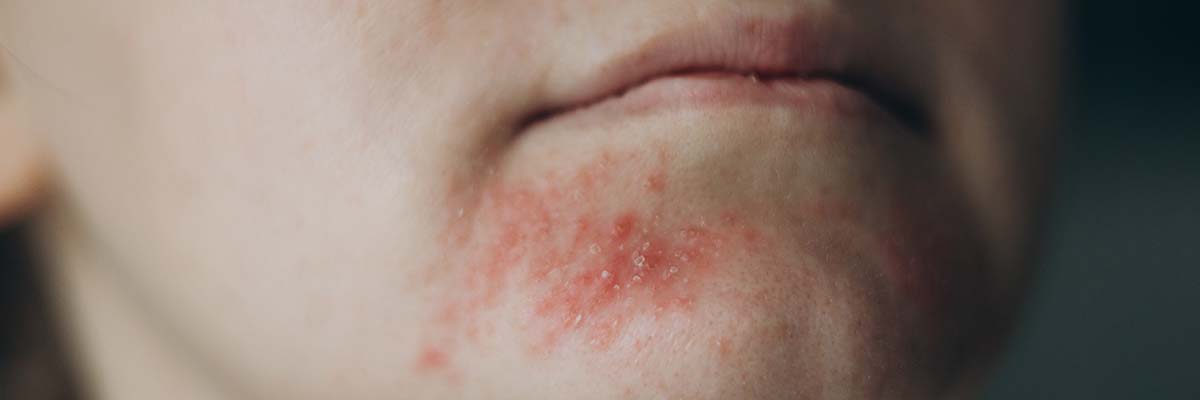Flared skin, or a “flare-up” is the common term that refers to when your skin is at its most irritated. Skin conditions such as atopic dermatitis, rosacea, and eczema will experience exacerbated symptoms during the active phase of flared skin, including increased redness, itching, dryness, swelling, or weeping.
Flare-ups can be triggered by various factors such as stress, environmental factors, hormonal changes, allergies, or irritants.
The duration and severity of flare-ups can vary for everyone. Treatment typically involves managing symptoms and addressing the underlying cause. This may involve lifestyle modifications, avoiding triggers and maintaining a consistent and gentle skincare routine.
Skin Conditions that experience flare-ups
There are various skin disorders that can experience flare-ups, leading to worsened symptoms. Some common skin conditions that may present with flare-ups include:
Atopic Dermatitis (Eczema)
Atopic dermatitis is an inflammatory skin condition characterized by symptoms such as itching, dryness, redness, scaling, swelling, and oozing. Eczema flare-ups can cause the skin to worsen and require appropriate management to soothe and calm the inflamed skin.

Contact Dermatitis
Contact dermatitis is a skin reaction that occurs when the skin encounters an irritant or allergen. It can lead to symptoms such as redness, itching, inflammation, and sometimes blisters. Flare-ups in contact dermatitis may occur upon exposure to triggering substances.
Perioral Dermatitis
Flared skin in perioral dermatitis refers to exacerbations of the characteristic symptoms of this condition, which include redness, scaling, and the presence of small bumps around the mouth, nose, and/ eyes. During flare-ups of perioral dermatitis, the affected skin may become more inflamed, itchy, and uncomfortable, potentially leading to pus-filled bumps around the mouth.
Seborrheic Dermatitis
Seborrheic dermatitis is a common skin condition that causes red, scaly patches and dandruff in areas rich in oil glands, such as the scalp, face, and upper chest. Flare-ups in seborrheic dermatitis can result in increased scaling, itching, and redness in the affected areas.
Rosacea
Rosacea is a chronic inflammatory skin condition that primarily affects the central face and is characterized by recurring flare-ups and remissions. During flare-ups, individuals may experience increased redness, flushing, and the appearance of small, pus-filled bumps.
Psoriasis
Psoriasis is a chronic autoimmune condition that accelerates the growth cycle of skin cells, leading to the formation of thick, red, and scaly patches on the skin. Flare-ups in psoriasis can cause rapid onset or worsening of plaques and requires a tailored treatment approach.
Flare-ups in these skin conditions often necessitate targeted skincare and lifestyle adjustments to manage symptoms effectively and alleviate discomfort.

Flared-skin Dos
It is essential to take specific steps to manage and alleviate the symptoms associated with flare-ups. Here are some tips to help soothe and repair your skin:
- Be very gentle. Avoid using harsh cleansers, abrasive exfoliants, or rough scrubbing, as these can further irritate the skin.
- Keeping the skin well-hydrated can help reduce dryness and irritation. Choose a gentle, fragrance-free non-comedogenic moisturiser that contains ingredients that have soothing and hydrating properties like ceramides, hyaluronic acid, and glycerine to help repair the skin barrier and retain moisture.
- Identify and avoid triggers that may exacerbate the flare-up. These triggers can vary from person to person but may include stress, certain foods, environmental factors, or specific skincare and haircare products.
- Applying a cold compress to the affected areas can help reduce inflammation and soothe the skin. The cold temperature can constrict blood vessels and alleviate redness and discomfort.
- Protect your skin from the harmful effects of the sun by using a mineral-based sunscreen that contains zinc oxide or titanium dioxide and avoid chemical sunscreens that can cause irritation.
Flare-safe AMPERNA® products you can use while your skin is inflamed:
- Lightweight Soothing Emulsion
- DS Soothing Serum
- Vitamin C Serum
- Soothing Day Mineral CC SPF15
- SOS Daily Facial Spray
- Wash and Lotion Duo
*IMPORTANT NOTE: In terms of cleansers our Ultra Gentle Soothing Cleanser is suitable for all skin types and has been successfully tried and tested on eczema, dermatitis, perioral dermatitis, rosacea, and acne prone skin. However during the active phase of a flare up it is recommended to cleanse your face with cool water only, using no product, until your flared skin has calmed down.

Flared Skin Don’ts
- Avoid using hot water when bathing, showering, or cleansing your face. Hot water strips away the natural oils in your skin leading to dryness and exacerbating inflammation.
- Avoid harsh abrasive scrubbing or exfoliating products. Rough particles can cause micro-tears and worsen inflammation.
- Avoid using strong ingredients like retinols (vitamin A), alcohol, menthol, essential oils, and fragranced products as these can aggravate inflammation and worsen the symptoms of flared skin conditions.
- Overuse of topical treatments. While topical treatments can be beneficial for managing inflammation, using them excessively or in higher concentrations than recommended can potentially irritate the skin further.
- Avoid where possible wearing makeup. Your skin needs time to breathe and heal when it is inflamed.


















